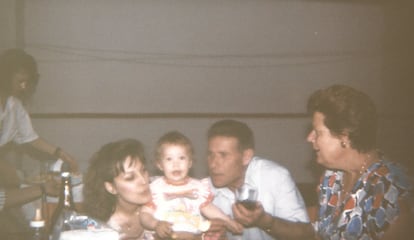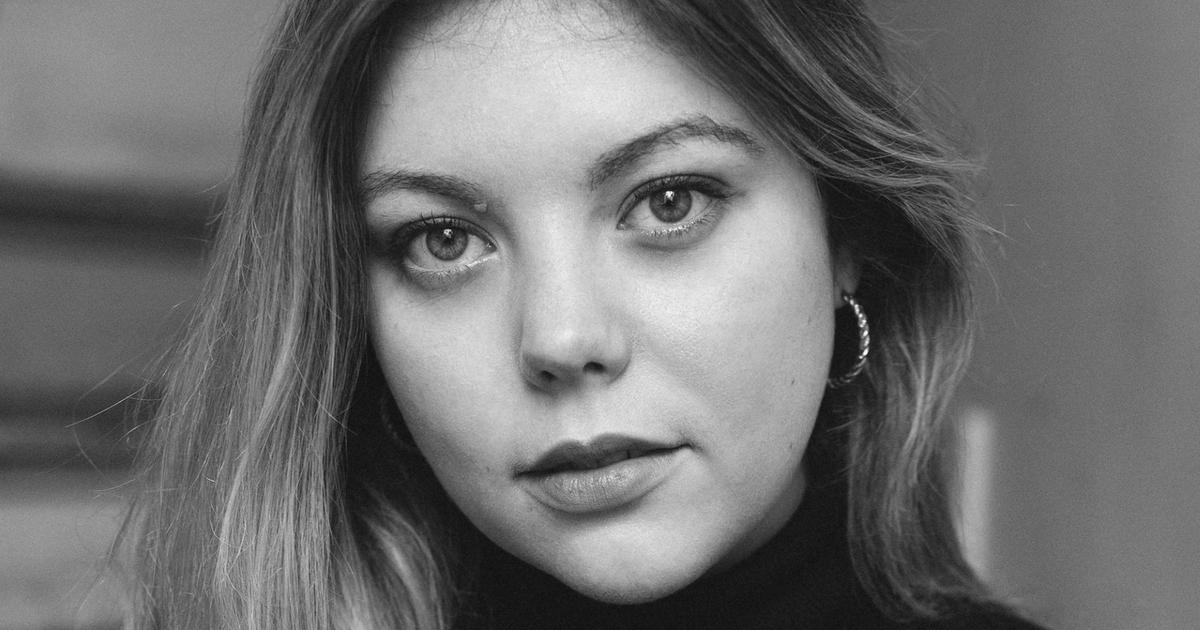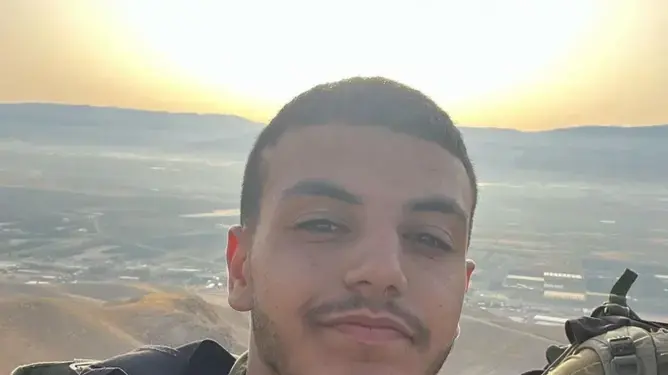Nydia still stings with the memory that she was not allowed to say goodbye to her grandfather Mariano.
He was 91 years old, had been vaccinated with all three doses and died on January 18, on a covid floor at the Puerta de Hierro Hospital in Majadahonda (Madrid).
He died without saying goodbye to his loved ones, because the clinic forbade them access.
The family insisted and insisted on seeing him, but the anticovid protocol of the center was clear: Mariano had to remain isolated.
Officially, his cause of death was covid.
But his granddaughter, 40-year-old Nydia, says he was found dead by hospital staff because the oxygen tube he was connected to had dropped or been removed, and no one noticed.
Now, as time goes by, Nydia wonders why she accepted the “no”, why she didn't “slam the door” and hugged her grandfather one more time.
"It cost me a lot that they didn't let me say goodbye," he says.
And he adds: "The duel in these conditions is very complicated."
It is the law of life that grandparents, at some point, cease to be.
But the pandemic has caused many grandchildren of several generations to lose their grandparents prematurely and, on many occasions, without being able to say goodbye to them.
Nydia's grandfather is one of the 92,486 people over the age of 70 who have died of covid since the start of the pandemic until July 19, according to the latest data from the Carlos III Health Institute.
This population accounts for 84.3% of the total deaths since March 2020. But the data from the last three months suggest that the people who die from covid are increasingly older: the deceased who were over 70 years of age represent from March 88.4% of all deaths.
Grief experts point out that the mourning of each grandchild is an individual experience and that it has to do with the type of relationship they had with that grandfather or grandmother.
However, Javier Yanguas, gerontologist and scientific director of the Fundación la Caixa Program for the Elderly, explains that, within each one's particular mourning, some emotions are repeated.
“You feel like you lost a caregiver and that in some cases it was even the nexus of the family.
Someone who was making your way through life and helping you to constitute yourself as a person.
Someone who gave you security, presence, affection and limits”, he sums up.
Yanguas points out that these emotions are even more shocking when the one facing this loss is a young child.
“In the case of children, in many cases it is the first time they face fragility, vulnerability,
This range of emotions also occurs in a pandemic context, in which grieving processes have been aggravated by various factors, explains Sara Losantos, head of the grief psychology area of the Mario Losantos del Campo Foundation (FMLC). .
Like the lack of goodbyes: “Participating in rituals and saying goodbye to the body of the loved one makes us more aware of reality.
Without this, that magical thought that denies death can take over us”, says Losantos.
Another has been the feeling that these are deaths that came before their time and that could have been avoided: “This adds pain to the one that already exists due to the loss and that will be something that must be accepted and also processed.
In addition, it can trigger reactions of impotence, a feeling of injustice and anger”, highlights the psychologist.
Since the first cases in early 2020, care for victims of covid has been adapting to the circumstances of each wave.
When the health authorities and society itself began to react to the first, it was already too late: then the most dramatic moments were probably experienced, when there were not enough staff or beds to care for everyone, when the elderly died in residences without medical care .
This was not repeated in such a stark way.
Only the third wave, in January 2021, once again put the system under such tension that the care of some patients had to be prioritized over others in the ICU.
The protocols were adapted to make them more humane as we began to understand how the virus was transmitted, but that has not prevented cases like Mariano's,
which is more an exception than the norm in 2022, after more than two years of the irruption of the covid.
These are three cases of three grandparents who were taken by the coronavirus in each of the years of the pandemic.
Mariano, January 2022. “What do I miss the most about him?
All"
Nydia acknowledges that the loss of her grandfather has been especially difficult because of how he died.
She was aware that her maternal grandfather was older and had been suffering from kidney failure for "15 years or so" that had left him with only one kidney, which only filtered 5%.
"I would understand and accept [her death of him] if he had died in another way," says Nydia.
Her family took Mariano to the Puerta de Hierro Hospital on the afternoon of January 15 because they thought he might have internal bleeding.
It turned out not to be the case, but during the days he was in the ER they tested him for coronavirus and he tested positive.
At that time, they isolated him in the center's covid floor.
No one there could visit him or talk to him on the phone, since his own cell phone had no battery and the landline in his room was disconnected.
48 hours passed without hearing from him or his condition.
Until Tuesday, January 18, Mariano's doctor called Nydia's mother, around half past three in the afternoon, to tell her that he was very ill.
That only “a halo of hope” remained.
Desperate, Nydia went to the nearest MediaMarkt and bought a mobile phone with a speaker and headphones.
“It was a phone that any nurse could put on the table near him, they didn't even have to hold it, and at least we could talk to him,” she explains.
About half past four in the afternoon, she got it.
Not knowing that it would be the last time, she spoke with her grandfather.
“He told me that he didn't understand why they were treating him like that, that he was tied up, that he was very cold, that he was very thirsty.
He really was a very tough person, he never complained,
Two hours after that call, hospital staff found him dead, disconnected from the oxygen he needed to fight covid and a respiratory infection that were advancing at the same time.
The family was finally able to enter the room, and Nydia remembers that "under his stretcher there were still the cloth handcuffs with which they had tied him up."
For her, it is inconceivable that he himself could have ripped the oxygen cable out of his nose while he was tied, but she does see it as likely that it had fallen off and that he would not have been able to reposition it, precisely because his hands were tied to the stretcher.
According to Nydia, the explanation they gave her as to why his grandfather was tied up was that they did it "to save his life."
“They told me that they were tied up so they wouldn't take away their oxygen,” she says.
“When I protested and then spoke with the doctor, she admitted to me that it was, in her words, “a hole in the system”.
That effectively these people are there, alone, incommunicado, they cannot watch over them and there are times when these things happen”, says the granddaughter.
“Then, in my head, I was reviewing everything we had done asking myself: what have we done wrong?
You feel very guilty”, confesses Nydia.
That guilt, she explains, "is for not having reacted against the hospital at that time, for not having confronted them and having been able to accompany him, help, prevent him from being cold, thirsty, afraid, in pain and dying tied up and without oxygen" .
“I get the feeling that I have failed her, that she should have been more courageous in that regard,” she adds.
“The good thing about time is that it reduces anxiety.
Still hurts,
but not in such an acute way,” he admits.
Grandfather Mariano had three daughters and eight grandchildren.
He was born in 1930, he was a doctor, from Madrid and a joker.
“What do I miss the most about him?
Everything, ”says the granddaughter of him.
Patricia Martínez Muñoz and her grandfather, Patricio, about thirty years ago in a family house in Playa de Los Narejos (Murcia).
Patricio, February 2021. “No one was able to accompany him when he died”
Patricia Martínez Muñoz's paternal grandfather died of covid on February 12, 2021, at the Molina Hospital, in Molina de Segura (Murcia).
He was 88 years old.
He died without being vaccinated, since vaccination for people over 80 years of age outside residences began the week of February 15, just a few days after his death.
Like Nydia, Martínez was also unable to say goodbye to her grandfather.
"No one was able to accompany him when he died," she laments.
"That's what makes me most angry and powerless."
She hadn't seen her grandfather Patricio since before Christmas 2020. "I don't even remember what wave we were in, but the infections had surfaced again and we decided not to get together for Christmas", precisely so that neither he nor his wife would get infected. grandmother.
At that time, Spain was going through the third wave of covid.
Grandpa Patricio was from Murcia and a vegetable gardener, and for Martínez, one more father.
When Martinez's father passed away nine years ago, his grandfather became his main father figure.
“It was like one more link I had with my father and, now that they have both died, that is disappearing,” he laments.
Almost a year and a half has passed since Patricio's death and Martínez continues to feel his absence.
“When we hang out as a family, it's not the same,” he says.
“I know that he has passed away, but for me it is still as if it did not happen.
One thing you don't see is like it doesn't happen,” he reflects.
Martínez, who is 36 years old, likes to visit the La Purísima Barriomar neighborhood in Murcia, where his grandfather was born and lived.
There, where her grandfather spent much of his life, taking care of his orchard, a passion that he managed to instill in his granddaughter.
“I go to the area from time to time and being there I feel like I have my family, my grandfather, my father,” she says.
In addition to that piece of land, Martínez keeps a hoe of his as a souvenir of the hours they spent together tending to the plants.
Patricia Martínez Muñoz and her grandfather, Patricio, at Martínez Muñoz's first birthday.
María Juana, April 2020. "I never imagined that I would not attend my grandmother's funeral"
When Daniel Cortés's grandmother died at the end of April 2020 in Casar de Cáceres, she had just turned 95.
Her name was María Juana, she had been a widow for more than 20 years and had four children, 11 grandchildren and seven great-grandchildren.
She “she was a very loving woman.
Like many others, she was a woman of that time, a housewife and caretaker of the whole family, ”says Cortés, her youngest grandson.
María Juana died in a nursing home, six weeks after the covid declared a pandemic on March 11, 2020.
“I was in a residence because I had needed more attention for months.
She was perfectly fine, but we didn't want her to continue living alone, because she lived alone until she was 93″, explains Cortés.
When the first positive for covid came out in the center, her grandmother was infected and she was hospitalized for almost three weeks.
“During those weeks, we couldn't see her.
Every three or four days she called the doctor to say if she was okay or not.
Sometimes, we were four days without knowing anything.
If they did not call you, you assumed that she was still alive, but she was there completely alone, ”she says.
A couple of days before he died, Cortés's family was able to speak with María Juana by video call.
But Cortes did not have that opportunity.
"I was in Badajoz and had decided to work piecework to forget how my grandmother was," he confesses.
“His death of hers was something she had been preparing for for a long time.
What I wasn't prepared for was not saying goodbye to her,” says the grandson.
When María Juana died, Spain was in a state of alarm and confinement, so Cortés could not return to his town.
“I never imagined that I would not attend my grandmother's funeral.
Because of all that, I had a hard time accepting that she had passed away, ”he admits.
“It took me a long time to realize that this had really happened.
One of the days that mark your life, because you lose a pillar, and you're not even here.
You are isolated, 100 kilometers away.”
When Cortés goes to town and passes by his grandmother's house, it is still strange for him to see the door and the windows closed.
"That's when I realize he's gone," he says.
“I am very grateful because I have been lucky enough to share almost 28 years of my life with my grandmother.
To have her very close to her, for many years.
The best thing that she could leave me is the time that she has shared with me, what she has taken care of me, everything that she has loved me”.
From María Juana he learned many things: among them, the importance of the phrase “well done, well it seems” or how to cook rice.
"I cook it like she did," says her grandson.
50% off
Subscribe to continue reading
read without limits
Keep reading
I'm already a subscriber



/cloudfront-eu-central-1.images.arcpublishing.com/prisa/SPWDCKJ77JHBZJ2MK2VVRXGWXY.JPG)


/cloudfront-eu-central-1.images.arcpublishing.com/prisa/ENOKQHD33NAGRAFBPP45GKFJGM.jpg)
